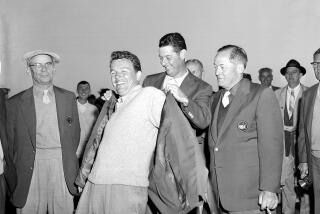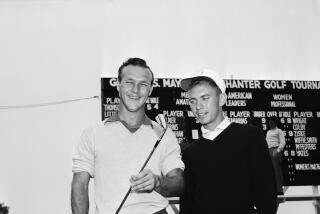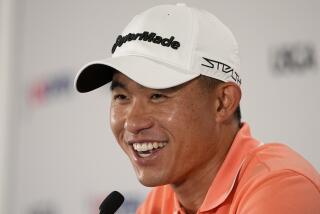It’s Getting Tougher to Make the First Cut : Senior golf: For Jerry Barber, 75, getting into tournaments could soon be more difficult than playing in them.
- Share via
On his 70th birthday, Jerry Barber was asked how long he thought he could continue to play on the Senior PGA Tour.
“Until they stop inviting me,” he said.
That time is drawing near. Soon, Barber, born in Woodson, Ill., but a longtime resident of Los Angeles, will be among the missing unless he is given a special exemption. He will turn 76 on April 25.
Under the senior tour’s eligibility rules, Barber is on the cusp. He used to be on the exempt list but recently has been bumped by incoming seniors who have made considerably more money on the regular tour than he ever had a chance to make.
If several players ahead of him on the eligibility list decide not to enter a tournament, Barber gets to play. But each year he slips further down the list and within two years, he will need a sponsor’s exemption to play at all.
Barber, 5 feet 5 and 142 pounds, is in excellent health and has been more durable than many professional golfers who started out years after he did.
Here are the PGA’s requirements for exempt status:
--The top 31 players on the 1991 senior money list.
--The top 31 from the combined--regular and senior tours--career money list, unless otherwise exempt.
--The top eight from qualifying school.
--Winners of senior events in the last year.
Barber no longer qualifies on any count.
Al Geiberger and Jim Colbert, members of the senior tour, say Barber deserves an exemption.
“I don’t know what we can do about the older players,” Geiberger said. “In the next few years, with so many good ones coming out from the junior tour, it will be a real problem.
“Most of the fellows who played when Jerry did no longer can play regularly. He still can. . . . It was truly remarkable how many times he shot below his age.”
Colbert, who just completed his first year on the 50-and-older tour, said: “Jerry has given so much to golf. He has helped so many people. I think he deserves special treatment.”
Last year, when Barber was exempt, he was in 32 tournaments, playing 96 rounds. He shot his age or better in 51 rounds and was 10th among the super seniors--60 and older--earning $80,000. Even in this group, he was giving away up to 15 years.
In this, his 51st year as a professional, Barber is off to a so-so start. He shot his age twice and finished with a 73 for 223 at Ojai March 6-8, then failed to break 80 in two of three rounds at San Antonio. He was not invited to the Arco Vintage Invitational last week at Indian Wells.
Barber turned pro in 1942 and joined the fledgling PGA Tour in 1948 when Ben Hogan, the top player, earned $32,000. Barber won five PGA events, including the 1961 PGA when, at 45, he beat Don January, 33, in a playoff.
He was PGA player of the year in 1961 and played on two Ryder Cup teams. He was captain in 1961.
Barber has not asked for special treatment, but he says there should be recognition for older golfers who won major tournaments, such as Jack Fleck, Tommy Bolt and Bob Rosburg.
“We petitioned the board,” Barber said. “But they rejected the idea.
“Although I wouldn’t presume to play in any of the tournaments, as a national PGA winner, I could play in the Tucson Open or the Los Angeles. Soon, while eligible on the regular tour, I won’t be on the senior tour.”
Arnold Palmer was talking recently about the disparity in the money earned three or four decades ago and now. Palmer joined the PGA in 1955.
“In those days, the tournament winner received between $1,200 and $2,000,” Palmer said. “The top 15 players participated in the purse. The 15th player received $100.
“That wasn’t enough to survive on. Anyone who finishes 15th on the regular tour now will soon be a millionaire.”
Barber was already 64 when the senior tour began in 1980. No one that age has ever won a senior tournament. Nevertheless, Barber has won more than $422,000 on the senior tour.
He also was part of a first. Last summer, his grandson caddied for him in a tournament.
And he still has a cherished goal. His oldest son, Tom, will turn 50 in November. Early next year, Jerry and Tom hope to become the first father and son to play in a senior tour event.
More to Read
Go beyond the scoreboard
Get the latest on L.A.'s teams in the daily Sports Report newsletter.
You may occasionally receive promotional content from the Los Angeles Times.










